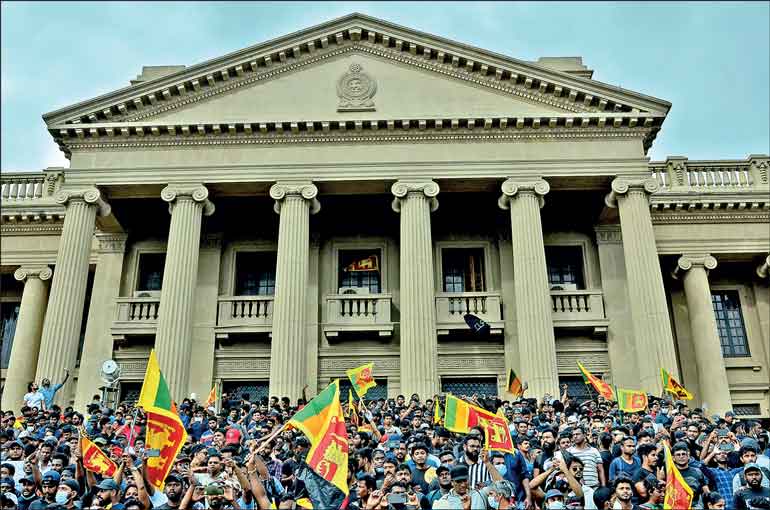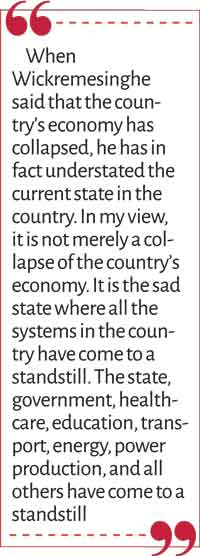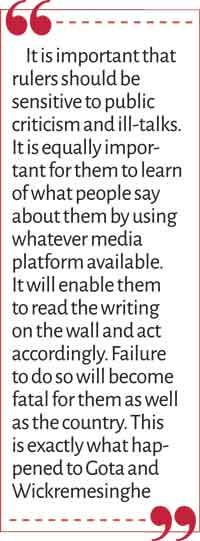Saturday Feb 21, 2026
Saturday Feb 21, 2026
Monday, 11 July 2022 00:10 - - {{hitsCtrl.values.hits}}

This is the first time in Sri Lanka’s history that protestors have entered a high security zone and got hold of the important buildings of government power. That was the message delivered to Gota and Wickremesinghe that they should step down immediately – Pic by Shehan Gunasekara
Ranil’s revelation in Parliament
Two weeks ago, Prime Minister and Finance Minister Ranil Wickremesinghe told Parliament and the country that Sri Lanka’s economy had collapsed. This was widely quoted in local as well as foreign media. Probably, he had been asking for forgiveness for his failure because he was not able to deliver anything that he had promised, or his close supporters had expected of him.
media. Probably, he had been asking for forgiveness for his failure because he was not able to deliver anything that he had promised, or his close supporters had expected of him.
Valid reasons for the assertion that economy had collapsed
But he had valid economic reasons to make that assertion which had started long before he assumed the Premiership. Economy had been undergoing a great shrinking exercise pushing it to a negative region at about 6% in 2022. This was to be extended to 2025, and any recovery could be expected only after that.
Lack of dollars
Dollars did not flow into the country as he had expected trusting his economic competence. As a result, the black market in dollars continued to loom over Sri Lanka. Anyone wishing to buy dollars could not do so at the Central Bank’s artificial rate of Rs. 365 per dollar. It was another fruitless exercise that had been followed by Central Bank Governors, W.D. Lakshman and Ajith Nivard Cabraal who had maintained the dollar rupee rate at Rs. 200 per dollar. That artificial rate collapsed in the third week of March 2022. Without dollars in the Central Bank to supply to the market to quench its thirst for this hard currency, the prognosis was that the Central Bank’s current artificial rate too will collapse without warning.
Black market was still thriving with a high premium of Rs. 40-50 over the official exchange rate. Therefore, it was a self-deceiving exercise by both the Central Bank and the Minister of Finance. Without dollars, the country could not ensure the import program needed by people as well as industries. There were long queues for fuel, cooking gas, and milk foods. India had come to help Sri Lanka by extending a credit line, but that credit line too got exhausted quickly.
The delayed IMF bailout
Problems became more acute when the expected bailout package from IMF could not be completed at the staff level. The team that had visited Sri Lanka returned to Washington, DC without giving anything. That was because the country could not come up with a blueprint for debt restructuring which was a precondition for extending a bailout package by IMF. Two spanners had been thrown to Sri Lanka’s path in this connection. One was the court case filed by one of the investors in ISBs maturing on 25 July, namely, St. Kitts and Nevis based Hamilton Reserve Bank, demanding the full repayment of moneys due to them becoming a holdout investor impeding the debt restructuring process. Then, the US Senate Foreign Relations Committee issued a Twitter message laying out three additional conditions for any bailout package. They were not to be completed immediately. Hence, the staff level agreement will not be reached by end-August as he had envisaged.
bailout package. They were not to be completed immediately. Hence, the staff level agreement will not be reached by end-August as he had envisaged.
Money printing and inflation
In the meantime, the past money printing had resulted in surging of all prices. Inflation that considers only consumer goods was running at 55% by end-June with food inflation rising to 80%, according to the underreported Colombo Consumers’ Price Index. It has a share of only 28% for the food category. But the Sri Lanka National Consumers’ Price Index which has a share of 45% for the food category was rising at a higher rate will reveal an inflation rate of close to 70% once the data are released by the third week of July. This is the highest rate of inflation which Sri Lanka has experienced in its post-independence history. Wickremesinghe should cage this monster with the support of the Central Bank which is already on a tight monetary policy program.
Stop funding the Government
IMF does not want the Central Bank to fund the Government anymore and has recommended that the Government should consolidate its budget – that is, it should reduce the budget deficit to an affordable level – by increasing taxes and pruning the expenditure except what is earmarked for supporting the poor. This is the biggest sacrifice which Sri Lanka should make and it requires all citizens from President to those in the street by giving up their modern lifestyles and being frugal in their approach to life. If the top leadership does not give an example to people, it is unlikely that they could command their support to go through the hardships. This is the challenge which the new interim government faces once it is formed.
Wickremesinghe inherited Gota’s sick economy
Wickremesinghe is not responsible for the current economic calamities in Sri Lanka. They are the handiwork of Gotabaya Rajapaksa and his key policy advisors. When he offered the attractive tax concessions to income tax and value added taxpayers, independent economists including this writer had warned Gota of its adverse consequences. (Visit: https://www.ft.lk/columns/Tax-cuts-Control-the-damage-before-the-unconventional-stimulus-backfires/4-691207). From the point view of his de facto policy advisor, it was a stimulus package. But it was an unconventional package because it had been offered without being asked by anyone.
I asked Gota to withdraw it before it would backfire by denting his revenue base. No ruler can survive or prosper by losing his revenue base. But it was implemented. Then in May 2020 I asked Gota again to postpone the costly tax reform because it has hampered the Government’s recovery plan (available at; https://www.ft.lk/columns/Constrained-fiscal-space-for-post-COVID-19-reconstruction-Consider- postponing-costly-tax-reforms/4-700327). But this was implemented without concern for its adverse repercussions. Over time, this tax cut became the ‘mother of all crises’ leading to all the economic ills which the country is now facing.
postponing-costly-tax-reforms/4-700327). But this was implemented without concern for its adverse repercussions. Over time, this tax cut became the ‘mother of all crises’ leading to all the economic ills which the country is now facing.
Sri Lanka has actually come to a standstill
When Wickremesinghe said that the country’s economy has collapsed, he has in fact understated the current state in the country. In my view, it is not merely a collapse of the country’s economy. It is the sad state where all the systems in the country have come to a standstill. The state, government, healthcare, education, transport, energy, power production, and all others have come to a standstill. This is similar to the Pompei City being overwhelmed by the soot of the Volcano Vesuvius that erupted without warning in 79 CE. People had died then and there while performing their day-to-day activities. Similarly, all Sri Lankan systems have stopped without the people being able to move forward or backward.
True cost of standing in queues
Standing in queues for days to buy the essentials – fuel, cooking gas, and milk foods – has been a daily annoying experience of Sri Lankans for many months now. The reason has been the inability to import them because of the lack of foreign exchange. This is not limited only to these items but to all other imported products like building materials, inputs for industries, and spare parts for motor vehicles. People are required to wait for months to get them. But what has been prominent has been queues for fuel and cooking gas where people had remained in those queues for days and nights.
I also stood in queues in my vehicle to buy petrol for four times. The first three times were in vain because even after staying in the queue for long 10 to 12 hours at a time, the expected petrol bowsers did not turn up. Disappointed, all those who stood in queues had to leave the queen at night. On the fourth day, I parked my car in the queue at 3 a.m. and waited patiently. The bowser laden with petrol came only at about 9 p.m. When I got my ration of petrol amounting to 20 litres, it was 11 p.m. In all, I had stood in the queue for 50 hours.
The money cost of a litre of petrol was Rs. 450. However, when the opportunity cost was added, it came to a staggering Rs. 12,000 per litre. That has been the real sacrifice that I had to make to get my petrol. When this happens daily, it is natural that people get annoyed, angry, and bitter. This is what led unarmed people of all walks of life to march to Colombo to demand both Gota and Wickremesinghe should step down on 9 July 2022.
Protestors finally reached their goal
The protestors met with stiff resistance from the Police. They were attacked by tear gas and water cannons several times. Yet their resolve could not be washed away by the high-pressure water cannons. When the attack was made, they quickly dispersed. But after the attack had ended, they quickly regrouped with a greater ferocity and vigour. At the end, they were successful in breaching the security barriers at both the President’s House and Presidential Secretariat and began to occupy them. Even the protestors held their media conference at the President’s House. This is the first time in Sri Lanka’s history that protestors have entered a high security zone and got hold of the important buildings of government power. That was the message delivered to Gota and Wickremesinghe that they should step down immediately.
cannons. When the attack was made, they quickly dispersed. But after the attack had ended, they quickly regrouped with a greater ferocity and vigour. At the end, they were successful in breaching the security barriers at both the President’s House and Presidential Secretariat and began to occupy them. Even the protestors held their media conference at the President’s House. This is the first time in Sri Lanka’s history that protestors have entered a high security zone and got hold of the important buildings of government power. That was the message delivered to Gota and Wickremesinghe that they should step down immediately.
Fun in the queue
Standing in the queue was another kind of experience. Though it is disappointing and annoying, there is a positive side to it also. It is the total strangers who meet in the queue. But they immediately form a bond among themselves because all of them have the goal. That goal tells them that collaboration and cooperation are the best weapons they have to realise their goal. Hence, a cooperating society is immediately formed without the direction of anyone. To kill the boredom and monotony, they start talking to each other because they now have a plenty of time to while away.
In this cooperating society, they become the law enforcers as well. In one of the queues I had stood, there was a motorist who had tried to insert his car well ahead of all of us into little space available between two cars. The drivers of the cars at either end were not present and hence, that stealthy act would have gone unnoticed. However, the youngsters who had stood in the queue behind me ran to that place and forced that stealthy driver to withdraw from the scene. In another instance, there was somebody who had squatted behind a car in the total darkness and doing something. When the same gang noticed it, they thought that he was stealing some valuable part from the car. They immediately ran up to him and chased him away. Even a policeman on duty would not have dome a law enforcement like that.
Opportunity to learn people’s opinions
I used the opportunity to learn of their views on President, Prime Minister, the Government, and various policies the Government had been adopting. They did not know who I was and therefore, spoke freely in my presence. None of them had any kind word for Gota or Wickremesinghe. Some even were abusive. That was quite understandable because they had stood in queues long hours totally exhausted and drained. If Gota or Wickremesinghe wished to learn of what people in the country would be telling about them, they could have employed a spy to gather that information. If they had done that, the writing on the wall would have been very clear to them. That is both Gota and Wickremesinghe are no longer loved, respected or believed. Most of them had wished that they both would have been eaten by sharks. That was the anger that had been boiling inside them.
about them, they could have employed a spy to gather that information. If they had done that, the writing on the wall would have been very clear to them. That is both Gota and Wickremesinghe are no longer loved, respected or believed. Most of them had wished that they both would have been eaten by sharks. That was the anger that had been boiling inside them.
Modern rules and using social platforms
In ancient times, kings who did not believe in the truthfulness of what their ministers were telling them had travelled in the night in cognito. Sometimes, they had disguised themselves as beggars and slept with other beggars. But it gave them an opportunity to learn of their opinions freely. In today’s context, Gota or Wickremesinghe does not have to travel in cognito to find out what people say about them. They can simply learn of it by examining the comments made by citizens on posts they had inserted to numerous social media platforms.
For instance, in one of his Twitter messages, Gota has expressed his shock at the shooting of the former Japanese Prime Minister, Shinzo Abe. But people who had commented below, numbering thousands, had cut him to pieces (visit: https://twitter.com/gotabayar/status/1545293070723194880?s=21&t=7EjXmkpURFzXxGZ5sCy_Ag). Wickremesinghe had also been given the same treatment by the public when he posted a Twitter message expressing his sorrow over the assassination of Abe (visit: https://twitter.com/rw_unp/status/1545323892906278912?s=21&t=7EjXmkpURFzXxGZ5sCy_Ag). The failure to do so has resulted in their losing power humiliatingly. In fact, Wickremesinghe had held the Premier’s post only for two months. During that period, he had become the target of public wrath.
Failure to read the writing on the wall
It is important that rulers should be sensitive to public criticism and ill-talks. It is equally important for them to learn of what people say about them by using whatever media platform available. It will enable them to read the writing on the wall and act accordingly. Failure to do so will become fatal for them as well as the country. This is exactly what happened to Gota and Wickremesinghe.
(The writer, a former Deputy Governor of the Central Bank of Sri Lanka, can be reached at [email protected].)